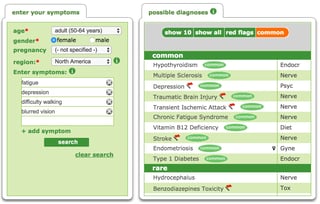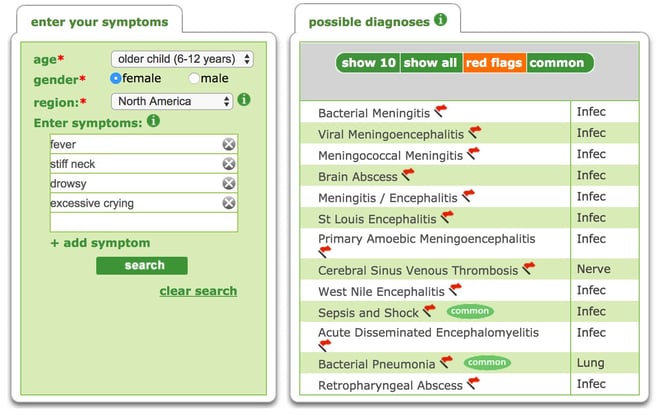- Privacy Policy
- Terms & Conditions
- Contact us
- ©Isabel Healthcare 2025
Could I have Multiple Sclerosis? | MS symptoms and diagnosis
 Unfortunately the answer to the above question is likely to be “we can’t tell yet, wait and see.” According to a new US survey, nearly 50% of MS patients reported they had visited their family doctor or hospital more than five times before receiving a diagnosis. On top of this, 42% of sufferers were initially misdiagnosed with a different condition.
Unfortunately the answer to the above question is likely to be “we can’t tell yet, wait and see.” According to a new US survey, nearly 50% of MS patients reported they had visited their family doctor or hospital more than five times before receiving a diagnosis. On top of this, 42% of sufferers were initially misdiagnosed with a different condition.
What is Multiple Sclerosis (MS)?
Multiple sclerosis is one of the most common diseases of the central nervous system, affecting around 2.3million people worldwide. More women than men contract this often devastating, life-long disease which tends to strike between the ages of 20-40, and is progressive.
MS is an auto-immune condition, meaning your immune system mistakes part of your body for a foreign substance and attacks it. In MS, it is the myelin sheath, a membrane which surrounds and protects the spinal chord and nerves leading into your brain, which is under attack. The myelin sheath becomes inflamed causing the messages travelling along the nerves to become slower or confused. This explains why the symptoms of MS are so varied from patient to patient, depending on which nerves have been most affected, and in turn this wide array of symptoms explains why reaching a diagnosis can take so long.
Multiple Sclerosis (MS) symptoms
Many MS symptoms are non-specific and are often confused with other conditions such as Depression, Fibromyalgia or Chronic Fatigue. In addition, some MS symptoms are invisible and hard to quantify. Patients sometimes don’t even report symptoms such as depression or memory loss because it doesn’t occur to them that they could be all linked to one disease.
Key symptoms which affect a lot of MS patients include:
- Excessive tiredness
- Numbness or tingling (pins and needles) in different parts of the body, but most commonly in the hands and feet
- Muscle stiffness or weakness
- Difficulty walking
- Blurred vision
- Impaired balance
- Problems with thinking and memory loss
- Poor bladder control
- Depression and anxiety
Other less common symptoms include:
- Constipation or bowel incontinence
- Speech difficulties such as slurred speech or low volume
- Difficulties swallowing
- An involuntary tremor or slight shaking
Most patients will only have a few of the above. While some sufferers notice their symptoms steadily worsening over time, with each new or worsening symptom being diagnosed as a ‘clinical relapse,’ for others the symptoms may come and go, or even disappear for a while, which is known as remission.
Early warning signs of Multiple Sclerosis (MS)
There are certain MS-related symptoms which require urgent treatment and, if treated properly could alter the course of the disease:
- Painful eye movements could be a sign of optic neuritis, which is a common early indicator of MS and, if diagnosed early enough, can be treated with medication
- A sudden loss of strength in your arms or legs or sudden breathing difficulties can suggest MS, but could also be a sign of a stroke: either way, urgent medical attention should be sought.
Types of Multiple Sclerosis (MS)
Once MS has been confirmed, your neurologist will try to identify which type of MS you are suffering from, though often this only becomes clear over time as a result of observing the development of symptoms:
Relapsing-Remitting MS (RRMS)
These patients have distinct attacks of symptoms which then fade away either partially or completely until the next attack. This can be months or even years away. Around 85% of sufferers have this type. When the relapse occurs, it can be in the form of new symptoms or previously experienced but possibly worsened symptom
Rapidly Evolving Relapsing Remitting MS
Also known as Highly Active or Severe RRMS, these patients have at least 2 disabling relapses in one year
Secondary Progressive MS (SPMS)
Around 50% of patients suffering from RRMS often go on to develop SPMS, usually 10 to 15 years after their initial diagnosis. SPMS is characterized by fewer or no relapses but instead a gradual worsening of symptoms or a cycle with much less time between relapses
Benign MS
This can only be diagnosed after a period of around 10 to 15 years of suffering from RRMS when it has been observed that the patient has suffered only mild symptoms with infrequent relapses. After each relapse, there is complete recovery. Around 10-15% of RRMS patients will be diagnosed retrospectively with Benign MS
Primary Progressive MS (PPMS)
PPMS begins with a slow progression of varying neurological symptoms with few relapses. Around 10% of MS patients will eventually be diagnosed with PPMS
Causes of Multiple Sclerosis (MS)
The causes of FM are just as elusive as the diagnosis but there do seem to be common triggers.
- While the disease isn’t necessarily inherited, it appears that siblings or children of an MS sufferer are 2-3% more likely to develop the disease, so genetics may have some part to play
- Since MS is much more common in colder countries, lack of Vitamin D has been named as a possible culprit
- Smokers are twice as likely to develop MS compared to non-smokers
- Certain infections, particularly those caused by the Epstein-Barr virus which causes Glandular Fever are thought to trigger MS
How is Multiple Sclerosis (MS) diagnosed?
As the results of the survey would imply, MS is not easy to diagnose and most people who experience some of the symptoms above are unlikely to be sufferers. A first step could be to enter your symptoms into the Isabel Symptom Checker to see if the condition appears in the Checklist.

You should also visit your Family Doctor or GP who may feel you need to be referred to a Neurologist for further tests. Even tests, however, won’t provide a definitive answer, especially if you’ve only experienced one single ‘attack’ of MS symptoms. A neurological examination would look out for abnormalities such as changes in your co-ordination, speech, reflexes or hand and leg strength which might indicate nerve damage possibly caused by MS. MRI Scans can be used to detect damage to the myelin sheath in your spinal column and brain. Some patients are offered an Evoked Potential Test which monitors your brainwaves and shows how quickly your brain reacts to light patterns shown to the eyes. Another form of diagnosis is the Lumbar Puncture which involves removing a small sample of spinal fluid by inserting a needle into the lower back. The sample is then tested for immune cells and antibodies to verify whether your immune system has been fighting a disease. Blood tests can also be performed as a means of ruling out other possible causes of your symptoms such as vitamin deficiencies.
Treatment of Multiple Sclerosis (MS)
Sadly there is currently no cure for MS though promising results are being reported from a number of clinical trials. For some patients, it is possible to treat the symptoms with a range of Disease Modifying Treatments (DMTs), which aim to reduce the amount of damage and scarring to the myelin sheath and consequently the number of relapses suffered. Physiotherapists and Speech therapists can also be involved in supporting symptom relief and many sufferers get help from alternative therapies or diet and exercise programmes.
Being diagnosed with MS can, for many, be overwhelming, frightening and distressing and for those who’ve spent months, possibly years waiting for their diagnosis, it raises as many questions as it answers. Many hospitals run self-management programmes to help you to adapt to life with MS. Local support groups are invaluable in introducing you to local fellow sufferers and offer counselling. Many MS patients compare the disease to riding a roller-coaster. Once you’re diagnosed, there’s no turning back, but support is available to help you deal with the highs and the lows of this complex and frequently misdiagnosed illness.
Useful links:
http://www.nationalmssociety.org/
Subscribe Here!
Recent Posts
Isabel DDx Companion with ChatGPT Integration - to help you diagnose even faster
At Isabel Healthcare, we’ve always been driven by one goal: to make clinical reasoning faster,..Virtual Triage: Do more questions lead to better patient outcomes?
One of the common misconceptions related to virtual triage / symptom checker tools is that the more..List Of Categories
- Differential Diagnosis Decision Support
- Differential diagnosis
- Symptom Checker
- Symptoms
- Medical Error
- Patient Disease Information
- Disease
- Clinical Decision Support
- Diagnostic Decision Support
- Isabel 1 Minute Read
- Diagnosis Error
- Diagnosis Skills Cases
- Healthcare Informatics
- Clinical Reasoning
- Evidence-based Medicine
- Medical Education
- Patient Engagement
- Symptom Triage
- Nurse Practitioner Education
- Nursing Decision Support
- Partnership
- Public Health
- COVID-19
- EHR
- Patient Empowerment
- Patient Safety
- rare disease

Start your FREE Trial today
Try the Isabel Pro DDx generator for 30-days - no payment card details required.



